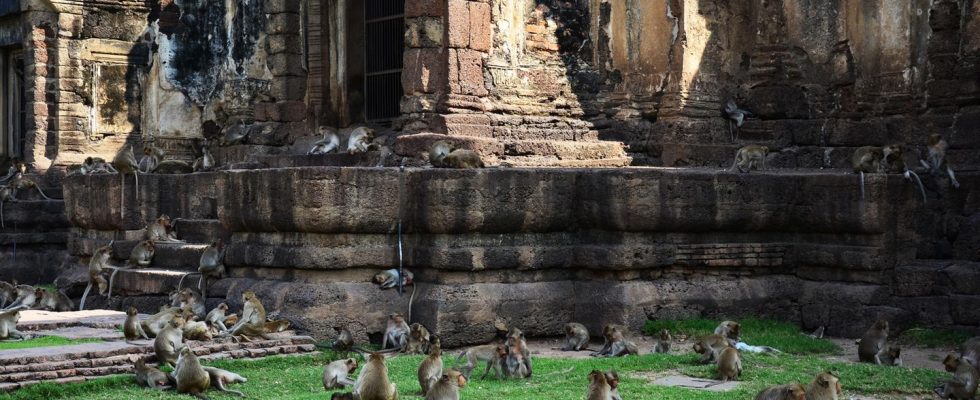The monkey town of Lop Buri, not far from Thailand’s capital Bangkok, is a real highlight for backpackers and animal fans. Unfortunately, the animal residents are becoming increasingly cheeky – and are now also attacking visitors.
Surachat Chanprasit actually finds monkeys quite cute. They are very similar to humans and extremely smart, curious and cheeky, says the Thai from the famous monkey town of Lop Buri, around two hours’ drive north of Bangkok. But when it comes to the Pingya Shopping Center, of which he is vice-managing director, the affection stops. Entire squads of long-tailed macaques regularly wreak havoc there. Unlike tourists, who are initially fascinated by the primates running around the city, most residents are thoroughly fed up with the monkeys.
“They invade through the roof or weak points in the wall,” Surachat told the German Press Agency. “And once they’re in the mall, they destroy our merchandise and our electronics, causing massive damage to inventory.” The primate gangs also repeatedly caused short circuits because they tampered with the high-voltage transformer on the roof. As if that wasn’t enough, the animals regularly demolish the entrance sign: “Every time we’ve repaired it, they tear it down again,” Surachat complains.
Since the increasingly aggressive cynomolgus monkeys, as the animals are called, also damaged customers’ cars and motorcycles and often stole the goods they had just purchased, fewer and fewer people were coming to the shopping mall. Shop owners and investors are now also leaving, annoyed.
Monkeys lounge around in the temple
For Lop Buri, its monkey population is both a blessing and a curse. On the one hand, the animals, which clamber along electricity pylons throughout the city and lounge photogenically in front of the Khmer ruins at the famous Phra Prang Sam Yot monkey temple, attract visitors from all over the world. On the other hand, they get on the citizens’ last nerve with their aggressiveness and destructiveness. Since there were increasing clashes between humans and macaques in March, which also resulted in injuries, the authorities are now looking for a longer-term solution that satisfies all sides.
A woman recently dislocated her knee when a macaque tackled her to the ground. In another case, a hungry monkey jumped onto the scooter of a man who was riding near the monkey temple with shopping bags on the handlebars. The driver fell and injured his foot while other animals rushed over to help themselves to the bags.
Police unit with slingshots on the way
“I don’t want people to have to hurt monkeys, and I don’t want monkeys to have to hurt people,” Athapol Charoenshunsa, director general of Thailand’s National Parks, Wildlife and Plant Conservation Authority, recently told reporters. A separate police unit sent out at the end of March, which was equipped with slingshots to keep the primates under control, has so far had only moderate success. “They couldn’t do anything, and such slingshots are not effective given the mass of macaques,” says Surachat.
The officers had been tasked with catching some particularly bold monkey leaders. A few dozen specimens also ended up in their net or cage and were supposed to be taken to other provinces or to zoos – but this was also just a drop in the ocean. Last year, more than 2,200 animals were counted in the city alone – with a population of less than 60,000 people. There were around 5,700 macaques in the entire province.
When Prime Minister Srettha Thavisin visited Lop Buri a few weeks ago, some citizens saw the opportunity to personally ask him for help in solving the problem. “In fact, monkeys are a unique symbol of Lop Buri. But public safety is also important,” the head of government noted, promising to address the issue.
Javanese monkeys are protected in Thailand
But getting control of the situation is not that easy. Because the monkeys have been fed by tourists for years, they automatically associate people with food. In addition, the long-tailed macaques (Macaca fascicularis), which live almost exclusively in Southeast Asia and are listed as “endangered” on the International Union for Conservation of Nature’s Red List (IUCN), are protected in Thailand. The animals are already extinct in Bangladesh, but it is not certain whether there are still specimens in Laos. Among other places, they can still be found today in Cambodia, Indonesia, Malaysia, Vietnam and the Philippines.
From India to Japan
Monasteries, grottos, tombs: where you come across magical places in Asia
Some residents, including Surachat Chanprasit, are calling for the monkeys in Thailand to be removed from the list of protected animals. “The province is not allowed to take any action against the animals without the approval of the responsible state wildlife authority,” he says. Capturing the macaques or moving them to other locations without consent from Bangkok is illegal. Many animal rights activists also tried to protect the monkeys from any interference, but ignored the problems of local residents.
The latest plan from Bangkok is to relocate the majority of long-tailed macaques to large enclosures. Only a smaller group should remain in the city. However, the enclosures would have to be large enough so that the animals could live there comfortably without feeling stressed, the newspaper “The Nation” reported. And such areas must first be identified and converted accordingly.
In the meantime, a macaque control center will be set up in the city, Environment Minister Phatcharavat Wongsuwan recently announced. Most of the monkeys there are supposed to be sterilized before they move. But until that happens, the monkeys will continue to be on the loose in Lop Buri – much to the delight of most tourists.

